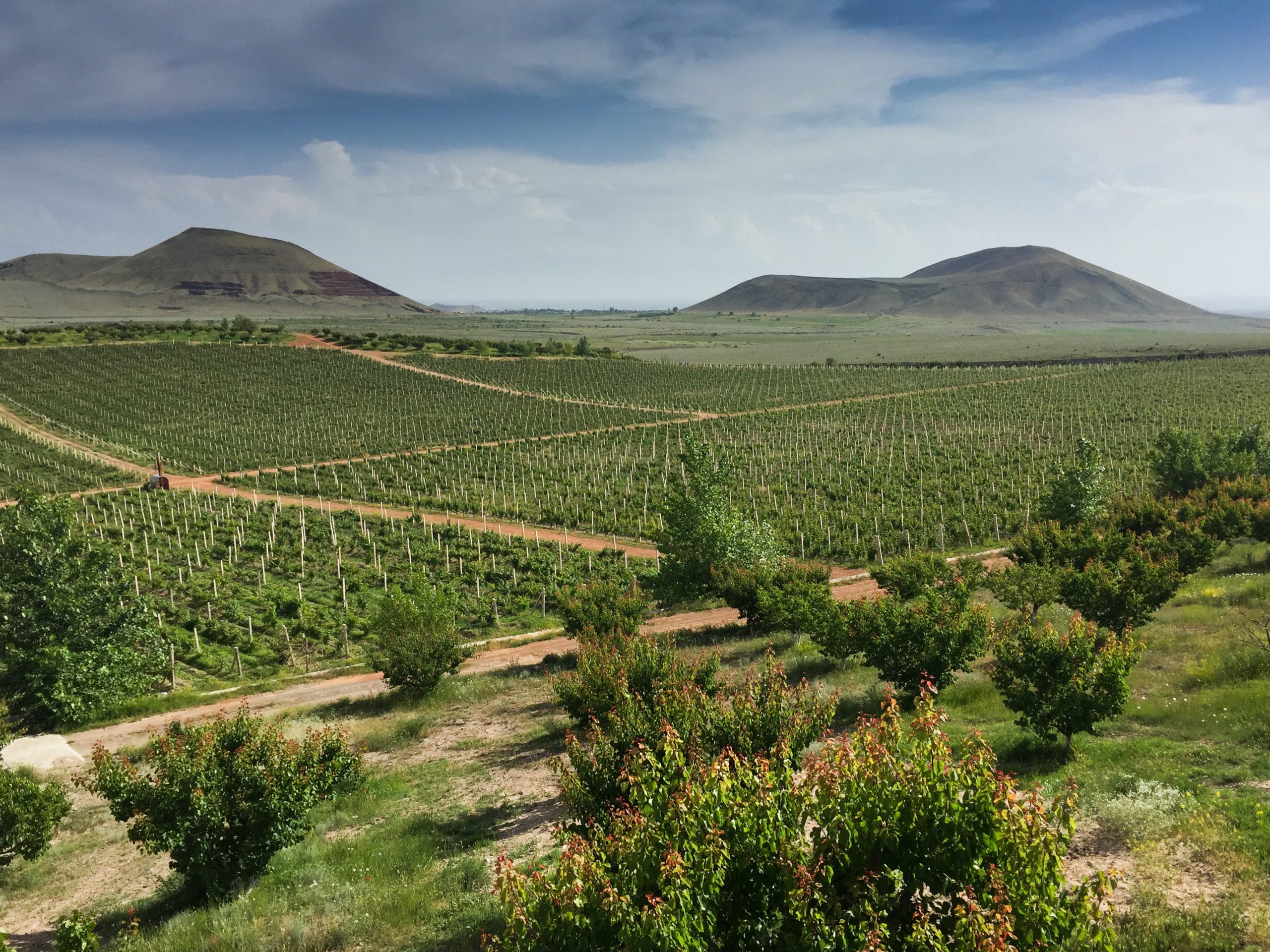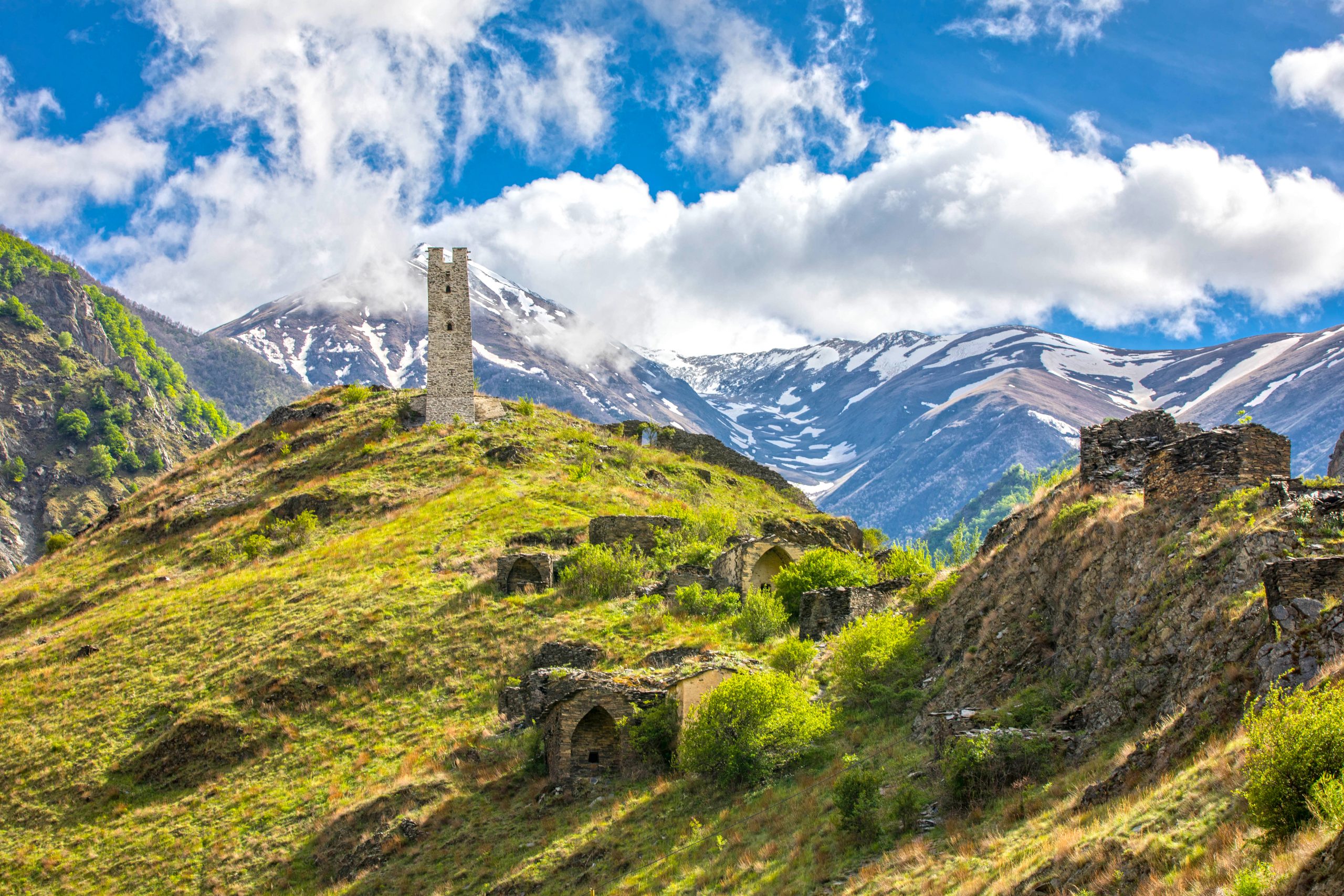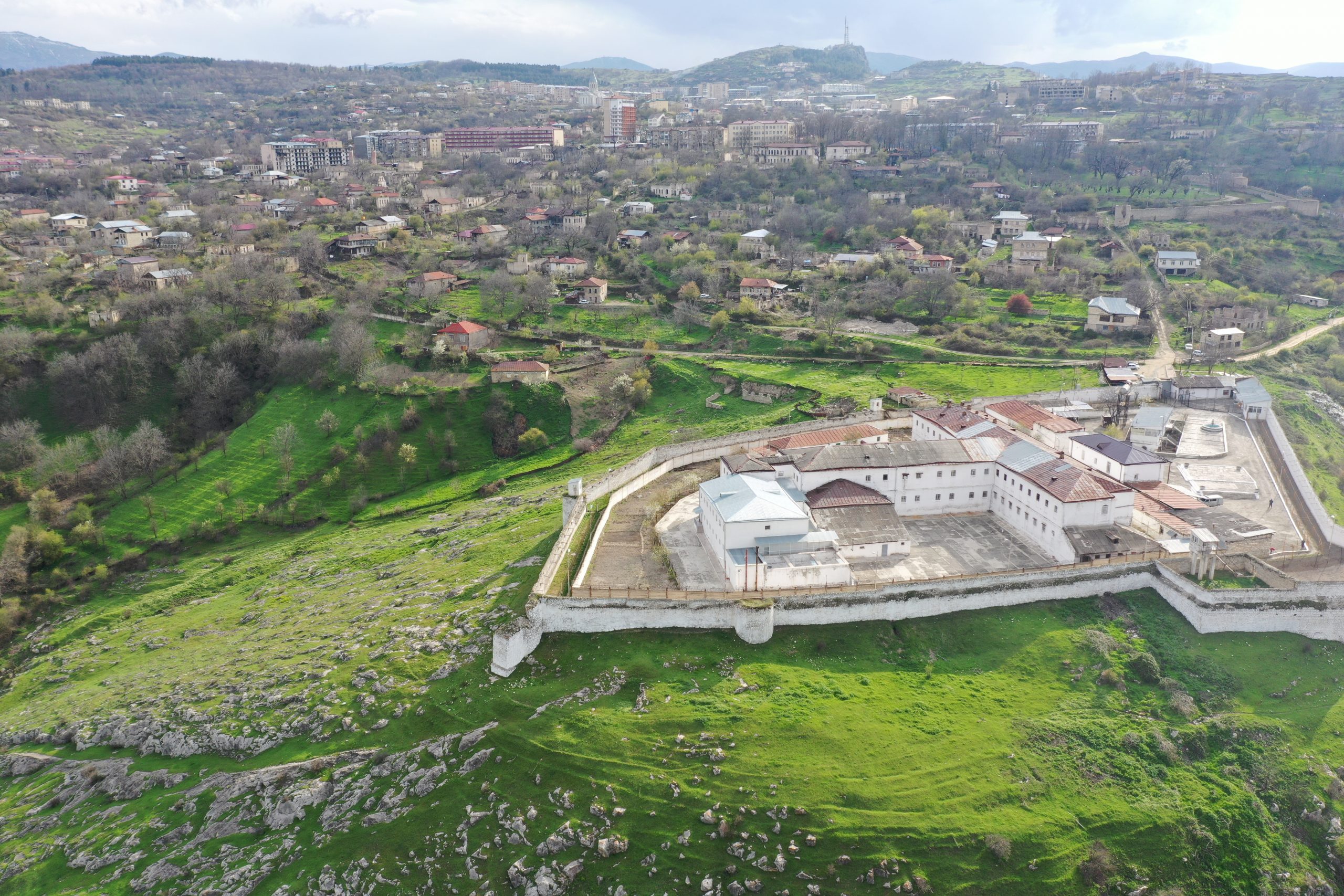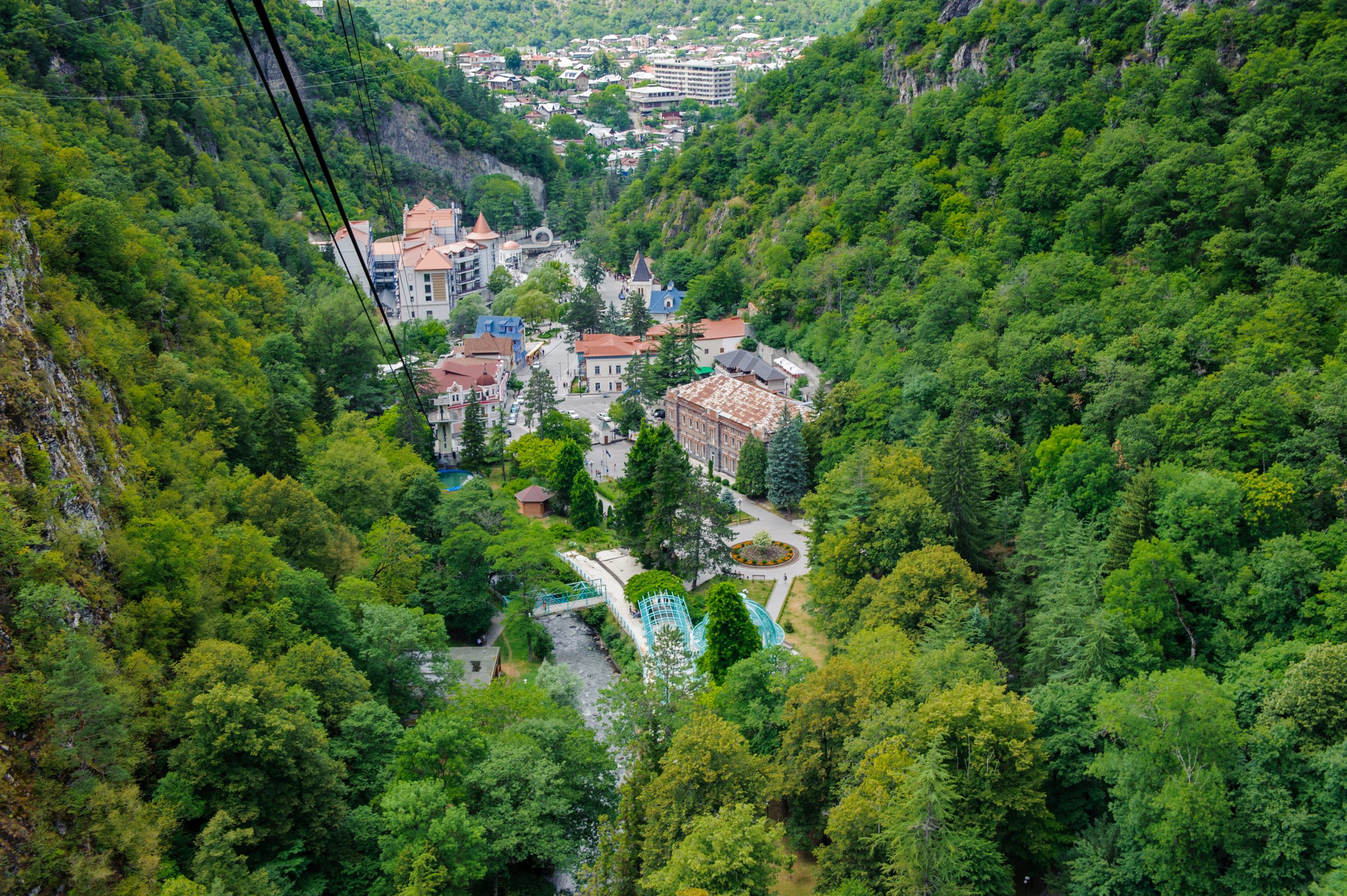Strategic Analysis Caucasus Brief
Bi-weekly review (31. 5. – 13. 6. 2021)
Tomáš Baranec and Marina Avram
Armenia

Vineyards, Aragatsotn province, Armenia. Photo: Elena Diego/ Shutterstock.com
A wave of resignations hits Armenian Ministry of Foreign Affairs
Armenia’s Foreign Minister Ara Ayvazians earlier resignation was followed by all four deputy ministers and the ministry’s chief spokesperson.
Ayvazian announced his intention to leave the post on May 27, just hours after an emergency meeting of the country’s Security Council, which discussed mounting tensions on the Armenian-Azerbaijani border.
Speaking at the meeting, Armenian PM Nikol Pashinyan offered that both countries withdraw troops from border areas with international observers deployed from Russia or another of the OSCE Minsk Group co-chairs, the US or France. The offer was welcomed by several Western countries, the EU, and OSCE but was met with disapproval among many in Armenia.
Deputy minister Gagik Ghalachyan and the ministry’s chief spokesperson Anna Naghdalyan announced their resignations on May 31. On June 7, Armenian media informed that already all four deputy foreign ministers tendered their resignations. The Armenian Foreign Ministry later confirmed those reports. It claimed that the resignations of Artak Apitonyan, Avet Adonts and Armen Ghevondyan were submitted to Prime Minister Nikol Pashinyan’s office for approval the previous week.
Minister made his first public comments on his resignation on May 31 at a farewell meeting with the Armenian Foreign Ministry staff. “The reason for my decision to resign was to make sure that there are never any suspicions that this ministry could take some steps or agree to some ideas, initiatives going against our statehood and national interests,” he said in a speech greeted with rapturous applause“. “In general, diplomats are perceived as conformist and adaptable individuals keen to avoid conflicts,” he said. “I believe that in these difficult times, we do not have a right to do that, and I am confident that there will be principled diplomats among us who will become role models for our society,” stressed Ayvazian.
Pashinyan’s spokesperson, Mane Gevorgyan, quickly urged the outgoing minister to publicly clarify “who exactly, when, where and how” was going to take steps or make a decision counter to Armenia’s interests.
As the OC Media reminds, tensions between the PM and his foreign minister previously became public earlier in May regarding a draft agreement between Armenia and Azerbaijan that Pashinyan claimed he was ready to sign. The Foreign Ministry responded that it was not aware of the agreement, which would set up a demarcation commission with Azerbaijan with Russian coordination.
Sources:
- AVETISYAN Ani, OC Media, “Exodus from Armenian Foreign Ministry follows border tensions”, https://oc-media.org/exodus-from-armenian-foreign-ministry-follows-border-tensions/
- Azatutyun.am, “Armenian Foreign Minister Explains Resignation”, https://www.azatutyun.am/a/31282523.html
- Asbarez.com, “Resignation of Deputy Foreign Ministers Confirmed”, http://asbarez.com/203005/resignation-of-deputy-foreign-ministers-confirmed/
For additional information, see:
- MEJLUMYAN Ani, Eurasianet.org, “Armenian top diplomats resign”, https://eurasianet.org/armenian-top-diplomats-resign
”Corridor negotiations” suspended between Armenia and Azerbaijan
Armenia-Azerbaijan-Russia trilateral working group on transportation had suspended its work due to the ongoing tensions on Armenian-Azerbaijani borders.
“As of today, the commission’s work isn’t continuing because effective and successful work requires an appropriate environment,” said Armenia’s deputy prime minister Mher Grigoryan on June 1. He explained that with “such a situation on the border”, constructive work on the topic is not possible.
Grigoryan emphasised that the Armenian side has not discussed and would not discuss corridor logic issues and that it is impossible to discuss such matters. “If by saying corridor some people mean transport ways, it is one issue, but if by saying corridor they mean any circumstance relating to sovereignty, I again assure that it is excluded on the agenda of my discussions,” he added.
RIA Novosti later informed that according to a source, consultations of representatives of the Russian Federation, Azerbaijan and Armenia were held on June 2 in Moscow, despite Gregoryan’s earlier statements. “On June 2, trilateral consultations of representatives of Russia, Azerbaijan and Armenia were held in Moscow, at which they discussed ways to de-escalate the situation in certain border regions of Armenia and Azerbaijan,” the source claimed.
Sources:
- TASS, “В Ереване сообщили о приостановке работы трехсторонней комиссии с Россией и Азербайджаном (Yerevan announced the suspension of the work of the trilateral commission with Russia and Azerbaijan)”, https://tass.ru/mezhdunarodnaya-panorama/11524421
- Caucasus Watch, “Armenia suspends work in trilateral commission; Pashinyan and Macron discuss regional security”, https://caucasuswatch.de/news/3820.html
- RIA Novosti, “Источник сообщил о консультациях России, Армении и Азербайджана (The source reported on consultations between Russia, Armenia and Azerbaijan), https://ria.ru/20210602/konsultatsii-1735335581.html
For additional information, see:
- KUCERA Joshua, Eurasianet.org, “Armenia and Azerbaijan suspend “corridor” talks”,https://eurasianet.org/armenia-and-azerbaijan-suspend-corridor-talks
- JAM News, “Russia, Armenia, Azerbaijan hold trilateral consultations on de-escalation of border”,crisishttps://jam-news.net/russia-armenia-azerbaijan-hold-trilateral-consultations-on-de-escalation-of-border-crisis/
Armenian Health Minister apologises for “improper handling” of soldiers’ remains
A photo showing the remains of fallen soldiers stacked haphazardly in bags in a dirty room sparked outrage in Armenia and forced several senior officials to apologise.
“I would first like to apologise to all the relatives in connection with the improper storage of the bodies and remains of the [fallen soldiers] that was recorded at the Abovyan [city] branch of the Forensic Medical Center yesterday,” the Minister of Health of Armenia, Anahit Avanesyan, wrote on Facebook. She added, it was her omission that “after some relocations, she did not personally visit [medical centre] again to make sure about the details of the maintenance of the remains”.
The ministry said that the remains in question were of soldiers who had been identified but not yet collected by their families. It also denied rumours that the remains were being concealed to hide the number of soldiers who died in the war.
Sources:
- AVETISYAN Ani, OC Media, “Armenian Health Minister apologises for ‘improper handling’ of soldiers remains”, https://oc-media.org/armenian-health-minister-apologises-for-improper-treatment-of-soldiers-remains/
- News.am, “Armenia health minister: Improper storage of fallen soldiers’ bodies, remains was my omission”, https://news.am/eng/news/646448.html
For additional information, see:
- Caucasian knot, “In Armenia, investigators disclose details of the case on storage of soldiers’ remains,” https://www.eng.kavkaz-uzel.eu/articles/55739/
Armenia to stop labelling local grape spirits as “cognac”
The European Union is ready to provide €3 million to Armenia for the country to stop using the name “cognac” when labelling its famous alcoholic products, an agreement on financial support approved by the government on June 10 reveals.
Armenia should now use the funds to ensure a smooth transition to a new name, develop a new brand for the Armenian drink, advertise and stimulate the use and distribution of the new name, as well as achieve the preservation of the position and competitiveness of the new Armenian brand in foreign markets.
As Eurasianet informs, Armenia agreed to stop using the word “cognac” as part of a comprehensive partnership agreement that came into effect in March. Parliament passed the relevant provision on June 10, making the release of the funds possible, local media reported. How the money will be spent was not immediately clear.
Sources:
- Eurasianet.org, “Europe to pay Armenia €3m to rebrand its ‘cognac’”, https://eurasianet.org/europe-to-pay-armenia-eu3m-to-rebrand-its-cognac
- Panarmenian.net, “Armenia to stop labelling alcoholic products as “cognac” with EU funding”, https://www.panarmenian.net/eng/news/293493/Armenia_to_stop_labeling_alcoholic_products_as_cognac_with_EU_funding
A land mine in Kelbajar kills four
A land mine explosion on June 4 resulted in the death of four people, including two journalists in the Kelbajar region of Azerbaijan.
The 32-year-old operator of AzTV state television Siraj Abishov and AzerTAj news agency journalist Maharram Ibrahimov who were killed in an accident were covering the latest events in the territories that have recently come under the control of Azerbaijan.
After the tragedy, Baku sent a complaint to the European Court of Human Rights (ECHR) about Armenia’s refusal to provide maps of minefields in the territories that came under the control of Azerbaijan. The ECHR rejected the request to apply measures to secure the complaint, the Armenian representative unit at the European Court reports. Azerbaijan’s complaint to the ECHR is expected to increase the pressure on Armenia to ensure the compliance with country’s international obligations, the “Azertac” agency reports.
JAM News reminds, that according to the State Agency for Mine Action in Azerbaijan (ANAMA), during the last week of May alone a total of 90 anti-personnel and 14 anti-tank mines, as well as 75 unexploded remnants of war, were found in Terter, Agdam, Fizuli, Shushi, Gubadli, Jebrail, and Zangilan regions.
Sources:
- JAM News, “Four people including two journalists killed in mine explosion in Azerbaijan”, https://jam-news.net/four-people-including-two-journalists-killed-in-mine-explosion-in-azerbaijan/
- Caucasian Knot, “ECtHR refuses to request maps of minefields from Armenia”, https://www.eng.kavkaz-uzel.eu/articles/55738/
Azerbaijan hands over 15 Armenian POWs in exchange for maps of minefields
Azerbaijan handed over on June 12, 2021, 15 Armenian prisoners of war in exchange for a map showing the location of land mines in part of the disputed Nagorno-Karabakh region.
Azerbaijan’s Foreign Ministry said the maps turned over by Armenian authorities detailed the location of nearly 100,000 land mines in the Aghdam region of Nagorno-Karabakh. “The 15 Armenian captives were turned over on the Azerbaijani-Georgian border with the participation of Georgian representatives,” the ministry said.
The ministry also thanked the US Secretary of State Antony Blinken, top US diplomat for Europe and Eurasia Philip Reeker, the European Council President Charles Michel, and the OSCE Swedish chairmanship for their role in negotiations.
Office of Georgian Prime Minister Irakli Gharibashvili said in a statement that the “captive Armenian troops were transported from Azerbaijan to Georgia and then sent to Armenia”. “An important step has been made towards the amelioration of security environment in the South Caucasus region,” reads the statement.
Sources:
- rferl.org, “Azerbaijan Says 15 Armenian Military Prisoners Swapped For Land-Mine Map”, https://www.rferl.org/a/azerbaijan-armenia-prisoners-of-war-land-mines-map/31304175.html
- Dawn.com, “Azerbaijan hands over 15 POWs to Armenia”, https://www.dawn.com/news/1629080/azerbaijan-hands-over-15-pows-to-armenia
For additional information, see:
- KUCERA Joshua, Eurasianet.org, “Armenia and Azerbaijan exchange detainees for mine maps”, https://eurasianet.org/armenia-and-azerbaijan-exchange-detainees-for-mine-maps
Baku declares Shusha a culture reserve
On May 31, members of the Azerbaijani Parliament have adopted in the third reading the bill “On the city of Shusha, the cultural capital of Azerbaijan”. The bill envisages the creation of a state city reserve in Shusha.
As Caucasian Knot informs, the President of Azerbaijan Ilham Aliyev instructed his subordinates to return to the city of Shusha its historical appearance, restore the mosques, and revive the Days of Vagif’s Poetry and the “Khary Bulbul” Festival.
Sources:
- Caucasian Knot, “Azerbaijan’s authorities declare Shusha a culture reserve”, https://www.eng.kavkaz-uzel.eu/articles/55697/
UNM ends its boycott of the Parliament, but refuses to sign EU-mediated deal
The United National Movement (UNM), Georgia’s largest opposition party, announced on May 30 it will enter the Parliament, thus ending their six-month-long boycott that started after the controversial October 31, 2020 elections.
In an announcement following a meeting of party leaders, UNM chair Nika Melia said the party would still not sign a deal reached between the government and other opposition parties to end the political crisis.
Melia claimed that the agreement put forward by European Council President Charles Michel contained “a point that is categorically unacceptable”, referring to an amnesty law for those charged over violence between police and protesters in June 2019. Melia was himself among the protesters charged over the clashes, along with several police officers who fired rubber bullets indiscriminately into the crowds.
The UNM has been meeting to decide whether to end their boycott since Melia was released from prison on May 10 — a condition of the EU-mediated agreement. The entry of the UNM into the parliament was followed by a sharp reaction from the political spectrum of the country.
The ruling Georgian Dream party wrote on Twitter that the “radical” United National Movement, having effectively admitted defeat of their destructive political agenda, takes up seats in the Georgian Parliament. UNM, however, refuses to sign the EU-mediated political agreement, which is the basis for consensus for ending the political crisis.
The EU Delegation to Georgia and the U.S. Embassy in Tbilisi in a joint statement dubbed the move “another positive step towards the strengthening of Georgia’s democratic institutions” but expressed regret over the UNM refusing to sign the April 19 deal.
Given statement highlighted that the largest opposition party “shares the responsibility” to engage in the legislature to address “perceptions” of politicised justice, work on “ambitious” electoral and judicial reforms, and participate in power-sharing at the Parliament.
The EU mediated deal includes promised electoral and judicial reforms and commits the government to hold snap parliamentary elections in 2022 if Georgian Dream fails to win 43% of the popular vote in this year’s local elections.
The UNM’s decision means only three MPs are still continuing to boycott the parliament: Elene Khoshtaria, who was elected under the European Georgia Party before later quitting the party, Law and Justice Party leader Tako Charkviani, who ran as part of the Strategy Aghmashenebeli election bloc, and the Labour Party leader Shalva Natelashvili.
Sources:
- Civil.go, “UNM to Enter Parliament, Refuses to Sign EU-Brokered Deal”, https://civil.ge/archives/423697
- FABRO Robbin, twitter.com, “Even in ending their boycott of parliament, the UNM have succeeded in annoying the EU and US”, https://twitter.com/RobinFabbro/status/1399022599221415941
- SHOSHIASHVILI Tata, OC media, “Georgia’s UNM ends boycott but refuses to sign EU-mediated deal”, https://oc-media.org/georgias-unm-ends-boycott-but-refuses-to-sign-eu-mediated-deal/
Foreign citizens can enter Georgia
Since June 1, foreign citizens can enter Georgia after undergoing a complete vaccination against coronavirus and a negative PCR test result.
A Government meeting chaired by Georgian Prime Minister Irakli Garibashvili was held on May 31 at the Administration of the Government. The Cabinet discussed 14 issues listed on the agenda.
According to him, April saw a 44.8% economic growth. Georgian Prime Minister Irakli Garibashvili said: “We expect rapid tourism recovery. Naturally, the reopening of land borders tomorrow will be another significant stimulus toward our economic recovery.”
Residents of neighbouring countries can come to Georgia for treatment and rest through the land borders that opened on June 1. Hotels are warning guests to comply with coronavirus restrictions. In hotels, you must wear medical masks and maintain social distance.
The most popular among foreigners is the Borjomi balneological resort, known for its mineral springs with healing properties. At the balneological resort of Tskhaltubo, visitors are attracted by the healing mineral waters containing nitrogen and radon, which are used for baths and inhalations.
Many foreigners visiting Georgian resorts fail to observe the mask regime and pose a risk of worsening the epidemiological situation, the head of the National Centre for Disease Control said on May 30, calling for stricter control over mask-wearing.
Sources:
- Caucasian Knot, eng.kavkaz-uzel.eu, ”Georgian health resorts ready to welcome foreigners after border opening”, https://www.eng.kavkaz-uzel.eu/articles/55708/
- Gov.ge, “Executive Government Meeting held on May 31, 2021“ http://gov.ge/index.php?lang_id=ENG&sec_id=566&info_id=79511
Officials begin taking children out of Orthodox orphanage in Ninotsminda
On June 4, the Georgian Agency for State Care and Assistance for the Victims of Human Trafficking said that that they have relocated six minors already, and other “around ten” were also set to leave the orphanage in Ninotsminda following information about alleged mistreatment of pupils. The orphanage is managed by the Georgian Orthodox Church.
Fifty-seven children are housed at the orphanage, which is located in Ninotsminda, a town in the South of Georgia near the Armenian border. A day earlier, police detained nine people during a protest titled “End Children’s Captivity!” outside the Prosecutor’s office in Tbilisi.
Protesters demanded the investigation of four shelved criminal cases, including one alleged rape of a minor, at the Ninotsminda orphanage. Metropolitan Spiridon Abuladze, the cleric who oversees the orphanage, has remained defiant, refusing to allow Public Defender Nino Lomjaria or her team to enter the orphanage grounds.
“The Georgian Orthodox Church is using its influence to thwart the inquiry”, Baiya Pataraya, the head of the “Sapare” (Protection Place) shelter for women and children, said on air of the “Formula” programme.
Eleven NGOs have demanded an immediate authorities’ reaction and noted that the boarding school is headed by Bishop Spiridon (Abuladze), who was suspected of rape. A former pupil of the boarding school said children were beaten up there, and in one case, to death.
In 2015, Georgia’s then–Public Defender, Ucha Nanuashvili, published a report describing a harsh punishment regime at the orphanage, including the denial of food, prohibition from leaving one’s room, and forcing children to “walk on their knees in the corridor with their hands or their heads, in front of their peers”. A 2017 report also mentioned the use of “Metanoia” to punish children.
In practice, Metanoia consists of “kneeling, praying, crossing oneself, then kneeling and touching the floor with your forehead” over and over again. Eventually, it becomes a painful and strenuous physical activity.
According to the Office of the Public Defender, between the years 2016 and 2021, three criminal cases have been launched in response to alleged violence against minors that took place at the orphanage, and one in response to the alleged rape of a minor.
Sources:
- Caucasian Knot, “Officials begin taking children out of Orthodox orphanage in Ninotsminda”, https://www.eng.kavkaz-uzel.eu/articles/55742/
- KINCHA Shota, OC media, “Georgian state officials to relocate over a dozen from controversial Church-run orphanage”, https://oc-media.org/georgian-state-officials-to-relocate-over-a-dozen-from-controversial-church-run-orphanage/
- SHOSHIASHVILI Tata, OC Media, “Child abuse allegations dog Georgian Church orphanage”, https://oc-media.org/features/child-abuse-allegations-dog-georgian-church-orphanage/
North Caucasus

Tsoi-Pede, Chechnya, Russian Federation. Photo:Eva Mont/ Shutterstock.com
Chechen-Dagestani border issue to be solved via negotiations
On June 3, the speaker of the Chechen Parliament commented that the Chechen government is ready to hold talks with Dagestan about the boundary between both republics.
On the border of Chechnya and Dagestan, there are disputed areas, notably the territory of Dagestan’s extinguished Aukh Chechen district. The deputy head of the Ministry of Property of Dagestan claimed the dispute must be decided through negotiations, and the borders should be conditional.
Vladimir Vasiliev, a former head of Dagestan, froze the work on clarifying the border with Chechnya because of the threat of losing his authority; and his successor, Sergey Melikov, is under risk, when addressing this issue, of facing the discontent of residents of border villagers, writes Caucasian Knot.
Rasul Asad, a blogger and the author of the “Ask Rasul” Telegram channel, also believes that the freezing of all procedures for defining the Dagestani-Chechen border was caused by Vladimir Vasiliev’s unwillingness to enter the processes that could damage his political image.
Mr Asad believes that if the border clarifying process is resumed, the Dagestani policy won’t change, despite the change in the republic’s leadership. In his opinion, heads of rural settlements and residents of border areas will play an important role in clarifying the border.
Magomed Magomedov, deputy editor-in-chief of “Chernovik” weekly, has noted that if the border definition process is one-sided and disregards the interests of both republics, this may trigger local residents’ protests. And the protest moods that have arisen against the background of procedural injustice can be used for one’s political purposes.
Sources:
- Caucasian Knot, eng.kavkaz-uzel.eu, “Analysts assess Melikov’s risks in addressing Chechen border issue”, https://www.eng.kavkaz-uzel.eu/articles/55752/
- Klyszcz U. Ivan, twitter.com, https://twitter.com/IvanUlisesKK/status/1400458033617010699
- Caucasian Knot, https://www.kavkaz-uzel.eu, “Вновь „джигитовка“ по спорным участкам границы Чечни и Дагестана. Доктор Моро (Djigitovka on the disputed sections of the border between Chechnya and Dagestan)”, https://www.kavkaz-uzel.eu/blogs/378/posts/49409



Contact us